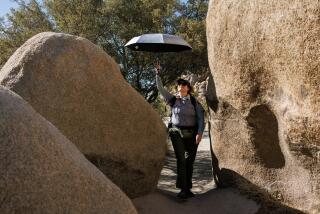THE FACTS ON . . . CAMPING IN MEXICO : WHAT TO BRING
- Share via
As with any camping trip, bring the essentials: tent, sleeping bags, camp stove or barbecue and ice chest. A first-aid kit is especially important because the nearest doctor usually is located in one of the bigger cities, such as Ensenada or Tijuana.
Water--For a trip to Baja, bring plenty of bottled water because many campgrounds have no running water. Five to 10 gallons (depending on the number of people and the length of the visit) in plastic containers should be appropriate for drinking and cleaning needs.
Insurance--All visitors to Mexico should purchase Mexican car insurance because authorities only recognize policies issued by companies licensed to transact insurance in the Republic of Mexico. Car insurance can be purchased at the border.
Trailers--Trailers more than 8 feet wide and 40 feet long require a special permit, which can be obtained only in Tijuana at Federal Highway Police Road Office.
Birth certificate--Nora Arias, of the tourist bureau in Ensenada, suggests that all visitors to Baja bring a birth certificate as proof of citizenship.
WHAT’S AVAILABLE
Camping fees--Most campgrounds charge $1 to $10 a car per night. Food supplies, such as meat, milk and bread, should be purchased before leaving the United States, because most campgrounds have no general stores nearby. Reservations for campgrounds generally are not necessary. For information on specific campgrounds, call the State Tourism Office in Baja, at (706) 676-2222.
Firewood--Firewood can be found in abundance at several roadside stands leading to the major campgrounds. A bundle of wood can usually be purchased for $1. A similar bundle in San Diego costs $3 to $5.
Restrooms--Most camps provide some kind of toilet facilities, either flush or chemical. Many have electrical hookups, but check ahead. Some campgrounds provide shower facilities.
Road conditions--Most roads leading to the major campgrounds are well maintained. More isolated camps, such as La Bufadora, are accessed by dirt roads. Such roads are in fair condition and normally must be traveled for short distances of a mile or less.
Trash--Most established campgrounds offer trash containers. If containers are not available, trash should be stored in secure containers and placed in an area that can’t be reached by animals.
WHAT TO DO
Fishing--Fishing licenses are not required for beach or bank fishing. Permits are required for fishing from a boat. Permits can be purchased for one day, one week, one month or one year. The tourist bureaus in Ensenada and Tijuana can provide such permits.
Boating--Most campgrounds offer rentals of boating, fishing and diving equipment at reasonable rates. If a specific campground does not offer such rentals, there are usually nearby camps that do.
Diving--Equipment for diving and snorkeling--such as air tanks, wet suits and masks--can be rented at most beach campgrounds. Prices range from $6 a day to $20 a day, depending on what type of equipment is rented.
More to Read
Sign up for The Wild
We’ll help you find the best places to hike, bike and run, as well as the perfect silent spots for meditation and yoga.
You may occasionally receive promotional content from the Los Angeles Times.






